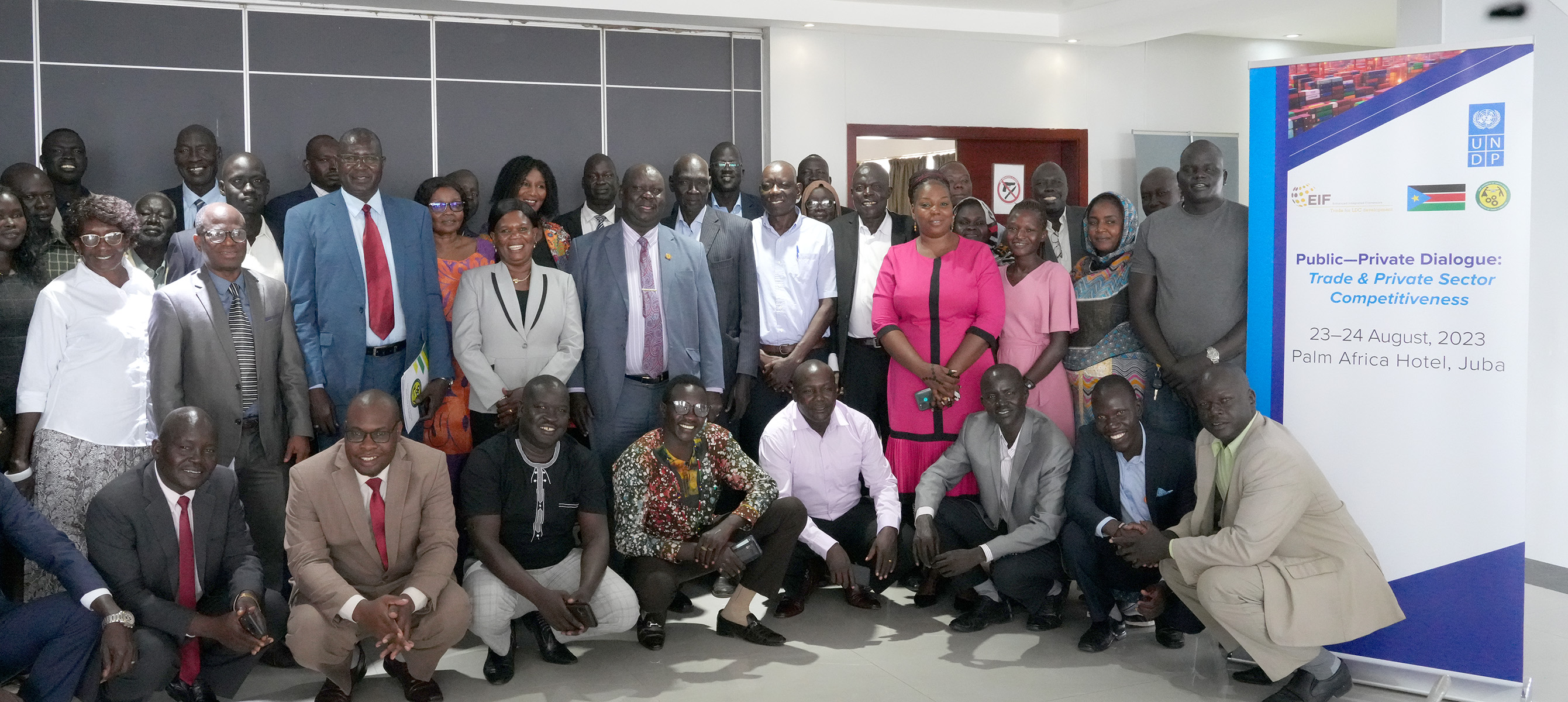UNDP and the Ministry of Trade and Industry open the Public-Private Dialogue sessions on trade policy and private sector competitiveness
August 22, 2023

Ministry of Trade and Industry at the Public - Private Dialogue Session
JUBA—August 22, 2023 The UNDP with funding from the Enhanced Integrated Framework (EIF) and in partnership with the Government of South Sudan through the Ministry of Trade and Industry are hosting two days of Public-Private Dialogue sessions to discuss the ongoing policy initiatives designed to support South Sudan’s trade competitiveness. Participants from the private sector along with development partners will have the opportunity to identify gaps in current policies, recommend policy actions that will fastrack the development of inclusive private sector development, and leverage Aid for Trade opportunities.
The Government of South Sudan, through the Revised National Development Strategy (R-NDS) 2021-2024, seeks to foster trade competitiveness and economic diversification, and to grow productivity of those sectors of the economy that have the potential to stimulate the development of vital sectors, such as agriculture. While the government has committed to increase investment in value addition to enhance products and economic diversification, the poor business environment remains the barrier to inclusive trade and private sector development.
The current socio-economic development situation and the macro-economic challenges facing the private sector here in South Sudan justifies the need to enshrine the principles of transparency, integrity, and equality in a participatory approach to facilitate dialogue between the private sector and government institutions, with the aim of creating a healthy business environment that will facilitate trade and economic development.
During the opening session of the Public-Private Dialogue on Trade Policy, Mr. Adam Kubanja, Chairperson of Association of South Sudan Manufacturers said,“…
The Technical Advisor to the Ministry Trade, Mr. Simon Nyang Anei officially opened the two-day dialogue, He stressed the importance of initiatives such as this in providing a platform for effective conversations between the business community and the government. “Collaborative policy-making platforms, like this one, are widely recognized as a fundamental component of economic development and a driver of inclusive economic growth -- they are not only a way of providing private sector input to government policies, but they also help governments focus private sector investment -- where it is most needed. The government is committed to providing goods and services through trade and to reviving factories to create employment opportunities for the people of South Sudan.”
Mr. Titus Osundina, UNDP Deputy Resident Representative encouraged members of the business associations, civil society organizations, research institutes, academics, and government officials who are attending the conference as essential participants in the process to building economic resilience. “The private sector and policy makers are the champions and custodians of the process which we view as the cutting edge of development policy and a key accelerator in our shared fight to end poverty and boost shared prosperity. After all, the private sector plays a dominant role in providing investments and jobs. The public sector needs to transform from the provider to the enabler, catalyst, facilitator, and partner of the private sector and development. This collaboration is crucial for shared value. A shared value approach requires collective action across multiple stakeholders.”
Over the next two days, representatives from business associations, civil society, research institutions, academics, industry, regional trade affiliations, and development partners will participate in structured discussions on accelerating policy and regulations for a sound business environment; examine the foundations for economic resilience and regional integration; discuss market access, and standards and certification; explore the need for transparency in business laws; and learn more about how to leverage ‘Aid for Trade’ opportunities.
The discussions and the resulting recommendations are essential for the process of developing supportive policies and regulatory frameworks that will create a predictable and transparent business environment in South Sudan, to ensure sustainable and inclusive economic growth for small and medium size enterprises, and for large industries – which ultimately leads to better income generating opportunities and decent jobs, especially for women and youth.

UNDP DRRP Titus Osundina at the Ministry of Trade and Industry at the Public - Private Dialogue Session

High level delegates at the Ministry of Trade and Industry at the Public - Private Dialogue Session

Audiences at the Ministry of Trade and Industry at the Public - Private Dialogue Session
###
For further information, please contact: Sarah Abraham Communications Analyst, UNDP sarah.abraham@undp.org or Lynn O’Rourke, Communication Analyst, UNDP lynn.orourke@undp.org,
UNDP partners with people at all levels of society to help build nations that can withstand crisis, and drive and sustain the kind of growth that improves the quality of life for everyone. On the ground, in more than 170 countries and territories, we offer a global perspective and local insight to help empower lives and build resilient nations.

 Locations
Locations